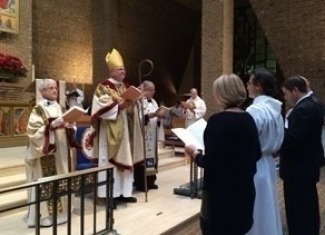May 2016
Transition and Change
Clergy Transition: Tips for Senior Wardens
In January 2013 I was installed as senior warden at the same annual meeting where our rector announced he was called to another parish. I had known for a few days this was going to happen but I still experienced a few minutes of terror when the announcement made it official. Suddenly, what I thought would be a year of collaboration with our long time rector became a year where much of the responsibility would lay with the vestry and me. Not only would we have to keep things running but also hire an interim rector, launch a search, and prepare the congregation for a new rector. Though it was a challenging year it was also an inspiring one. It deepened my faith and gave me a new appreciation for the giftedness of my congregation.
Here are 7 tips from my experience that helped make it a successful year of senior warden ministry. Perhaps these will be helpful to you.
1. Take a breath. There will be moments when things seem overwhelming. Take a breath and remember that God will give you what you need. I had an amazing junior warden and vestry team to help me work through situations as they arose. Find people you trust and let them help you.
Breathing also gives you a second to remember to slow down.At the beginning you will feel like many decisions need to be made at once. They don’t. The average period between rectors is 18-24 months. This time is important; it allows a congregation to put some distance between the past and the future.Breathe and let God work in that time.
2. Communicate and involve. Most of the anxiety that arises in transition can be calmed with good communication. Much of this needs to happen at the very beginning. Our junior warden and I sent a letter to the congregation the day after our rector announced his leaving. The letter explained how the vestry became the “ecclesiastical authority” in the absence of a rector. We gave an approximate time line of the search process and how important the interim period was for getting ready for what we were going to be called to do next as a congregation. The Sunday after our rector left we held a town-hall-style meeting where we again detailed how things would unfold and allowed for a questions and answers period.
We also asked for the congregation’s help. We let them know they were now all on the prayer committee and that we needed them to keep ministries thriving, attendance high, and pledging strong so that we would look great to potential rector candidates. This gave them some work and buy in and they rose to the occasion.
You also need to communicate regularly with your bishop and/or the diocesan transitions officer. They offer guidance and support to parishes in transition and will want to know how things are developing. I suggest a meeting at the outset of the transition so you can plan how you wish to work together.
3. Hire a qualified interim rector. There are actually professional interim rectors who are trained in this important ministry. The interim’s job is broader than serving as a placeholder; they help prepare the way for the next rector. The interim may have to do some “clean up” duty so that the new rector can come into the congregation and focus on the future. The interim may need to address human resource (HR) issues. A congregation may have ministries that are no longer effective and need to be “sun-seted” or policies that need to be rewritten or enforced.
The interim rector can also help prepare the congregation mentally for change. Our interim gave some excellent sermons talking about being prepared for God to do something new.
4. Pick an excellent search committee. Our vestry hired a search consultant who helped us with this process, as it is the vestry’s responsibility to pick the search team. The first reaction may be to pick based on demographics but we learned that the ideal is to pick on personal skill set. You need good writers, talented IT persons, and some folks with HR experience if possible. Team members need to come to the process without an agenda and with the ability to work toward consensus.Most importantly you need people who can commit many hours over an 18-24 month period as it is an extremely time consuming endeavor.
5. Mind the staff. During a transition most of the anxiety lies with the staff. They not only have to take on more responsibility but they are also faced with all of the fears that come with the prospect of getting a new boss. I met frequently with staff members to answer questions and keep them informed. The interim rector took them on retreat where they could discuss issues and dream about the future. Some staff will use this time to evaluate their own careers. In one week we announced the resignation of two associate clergy and our business manger. All of them left for fabulous opportunities but it was stressful for the vestry and the congregation. This brings me to the 6[1] tip:
6. Communicate (some more). The vestry knew the congregation would be concerned about three staff members leaving. The next Sunday I spoke at each service, repeating our message that God was with us and that we had good leadership and a good plan. Things will pop up during the interim and the quicker you are out front with answers the better.
7. Prepare your congregation and leadership for the reality that transition doesn’t endwhen the new rector arrives. There is at least a year more of transition as the new rector arrives, takes stock, and begins to try new things. This adjustment period takes patience and more prayer but your congregation will be prepared for this because of the groundwork you have laid during your term.
Through all of this I learned what a resilient and devoted congregation we have. I always felt well supported and received much feedback that they were excited about the future and grateful for the vestry’s leadership.
Try This
Your rector is leaving; your congregation is about to enter a period of transition. Here are some questions a vestry may want to consider:
- How will your responsibilities as a vestry member or warden change while your congregation is without a rector? What new things will you be accountable for? How might you support one another during this period of transition? What can you do to prevent vestry burnout?
- Transition in ordained leadership can produce anxiety in congregations. Suddenly there are many new questions: What will change? Who will replace the departing individual in the short and long term? How long will it take to find a replacement? What kind of changes might the interim and the new rector want to initiate? As the vestry, what approach will you take to minimize anxiety in your congregation.
Anne Rudacille Schmidt is a member of the Episcopal Church of the Transfiguration in Dallas, Texas. She currently works as a search consultant, guiding search committee’s through the process of calling a new rector. Anne is co-chair of the CEEP Planning Committee and a board member of Forward Movement. She is married to Walter and has 2 teenagers and enjoys running and yoga in her free time.
- Diocesan bishop and the diocesan staff member responsible for transition ministry
- “Healthy Transitions, Part 1,” Sandra Clark Kolb, ECF Vital Practices’ Vestry Papers January 201 and “Healthy Transitions, Part 2”
- “Leading Through Transition,” Jan Henderson, ECF Vital Practices’ Vestry Papers, January 2015
- The Episcopal Church’s Office for Transition Ministry
Don't miss an issue of Vestry Papers! Sign up for your free subscription here.
- 1. th






